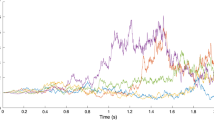Abstract
In this paper, we focus on a class of non-causal systems of differential equations, namely systems the variables of which can depend not only from the current or past time, but also from future time. For this type of systems, we study their solutions and present new and easily testable conditions under which any state of the system is stable. The stability analysis of a future-state-dependent set of differential equations has its relevance also in practical applications. Numerical examples, as well as an application in electric power engineering, are provided to justify our theory.


Similar content being viewed by others
Data Availability
The authors do not have any data related to this article.
Notes
per unit system (pu); in power engineering, quantities are often expressed as fractions of defined base units.
References
O. Bazighifan, I. Dassios, On the asymptotic behavior of advanced differential equations with a non-canonical operator. Appl. Sci. 10(9), 3130 (2020)
D.M. Boore, S. Akkar, Effect of causal and acausal filters on elastic and inelastic response spectra. Earthq. Eng. Struct. Dyn. 32(11), 1729–1748 (2003)
F.E. Cellier, E. Kofman, Continuous system simulation (Springer, New York, 2006)
N.R. Chaudhuri, S. Ray, R. Majumder, B. Chaudhuri, A new approach to continuous latency compensation with adaptive phasor power oscillation damping controller (POD). IEEE Trans. Power Syst. 25, 939–946 (2010)
L. Dai, Notes in control and information sciences, in Lecture singular control systems. ed. by M. Thoma, A. Wyner (Springer, Berlin, 1988)
I. Dassios, O. Bazighifan, Oscillation conditions for certain fourth-order non-linear neutral differential equation. Symmetry 12(7), 1096 (2020)
I. Dassios, A. Zimbidis, C. Kontzalis, The delay effect in a stochastic multiplier-accelerator model. J. Econ. Struct. 3(7), 1–24 (2014)
S. Devasia, Degang Chen, B. Paden, Nonlinear inversion-based output tracking. IEEE TAC 41(7), 930–942 (1996)
A. De Cheveigné, I. Nelken, Filters: when, why, and how (not) to use them. Neuron 102(2), 280–293 (2019)
J. Hale, Theory of functional differential equations (Springer-Verlag, New York, 1977)
M. Kitano, T. Nakanishi, K. Sugiyama, Negative group delay and superluminal propagation: an electronic circuit approach. IEEE J. Sel. Top. Quantum Electron. 9(1), 43–51 (2003)
F. Milano, I. Dassios, Small-signal stability analysis for non-index 1 Hessenberg form systems of delay differential-algebraic equations. IEEE Trans. Circuits Syst. I: Regular Papers 63(9), 1521–1530 (2016)
M. Liu, I. Dassios, G. Tzounas, F. Milano, Model-independent derivative control delay compensation methods for power systems. Energies 13(2), 342 (2020). https://doi.org/10.3390/en13020342
M. Liu, I. Dassios, F. Milano, Delay margin comparisons for power systems with constant and time-varying delays. Electric Power Syst. Res. 190, 106627 (2021)
M. Liu, I. Dassios, F. Milano, On the stability analysis of systems of neutral delay differential equations. Circuits Syst. Signal Process. 38(4), 1639–1653 (2019)
M. Liu, I. Dassios, G. Tzounas, F. Milano, Stability analysis of power systems with inclusion of realistic-modeling of WAMS delays. IEEE Trans. Power Syst. 34(1), 627–636 (2019)
T. Nakanishi, K. Sugiyama, M. Kitano, Demonstration of negative group delays in a simple electronic circuit. Am. J. Phys. Am. Assoc. Phys. Teach. 70(11), 1117–1121 (2002)
R. Rosen, Anticipatory systems: philosophical, mathematical, and methodological foundations (Springer-Verlag, New York, 2012)
S. Santra, A. Ghosh, I. Dassios, Second–order impulsive differential systems with mixed delays: Oscillation theorems. Math. Methods Appl. Sci. (2022). https://doi.org/10.1002/mma.7829
G. Tzounas, I. Dassios, F. Milano, Small-signal stability analysis of implicit integration methods for power systems with delays. Electric Power Syst. Res. 211, 108266 (2022)
A. Widmann, E. Schröger, Filter effects and filter artefacts in the analysis of electrophysiological data Frontiers in psychology. Frontiers 3, 233 (2012)
X. Yu, J. Jiang, Analysis and compensation of delays in fieldbus control loop using model predictive control. IEEE Trans. Instrum. Meas. 63, 2432–2446 (2014)
Acknowledgements
This work was supported by Sustainable Energy Authority of Ireland (SEAI), by funding Ioannis Dassios, and Federico Milano under Grant No. RDD/00681; and by the Swiss National Science Foundation, by funding Georgios Tzounas under NCCR Automation (grant no. 51NF40 18054).
Author information
Authors and Affiliations
Corresponding author
Additional information
Publisher's Note
Springer Nature remains neutral with regard to jurisdictional claims in published maps and institutional affiliations.
Rights and permissions
Springer Nature or its licensor (e.g. a society or other partner) holds exclusive rights to this article under a publishing agreement with the author(s) or other rightsholder(s); author self-archiving of the accepted manuscript version of this article is solely governed by the terms of such publishing agreement and applicable law.
About this article
Cite this article
Dassios, I., Tzounas, G. & Milano, F. Stability Criterion of a Class of Non-causal Systems of Differential Equations. Circuits Syst Signal Process 42, 2452–2467 (2023). https://doi.org/10.1007/s00034-022-02221-1
Received:
Revised:
Accepted:
Published:
Issue Date:
DOI: https://doi.org/10.1007/s00034-022-02221-1



